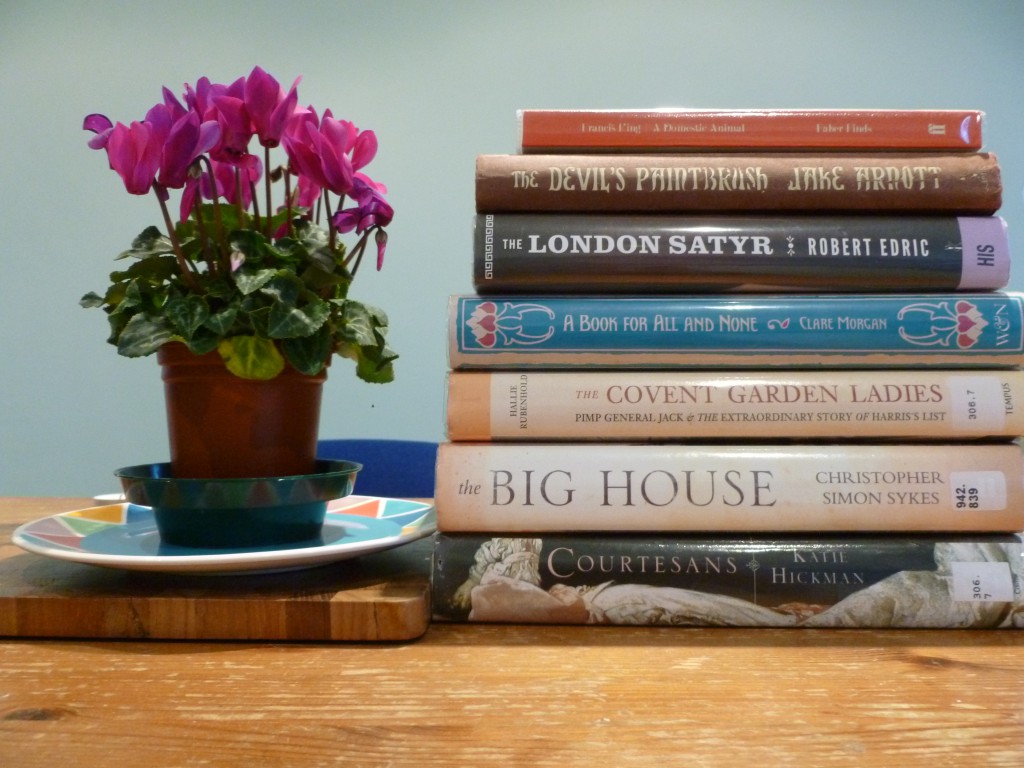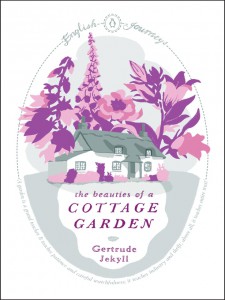Library Loot!
Since I started reading book blogs I have gazed enviously at posts reporting the books that bloggers have got out from their local libraries in the weekly Library Loot posts, hosted by Claire of The Captive Reader and Marg of The Adventures of an Intrepid Reader. At long last, I finally live in a place where I have access to a library! Up until now commuting such a long distance has meant that I got home too late to use the library in the evenings, and having a long distance relationship has meant most of my weekends have been full, particularly over the last year or so. However, now that I’m settled happily in Sussex I live five minutes’ walk from my local library and so the first day I had spare I went straight round to register.
I have to say it’s something of a revelation. The library has a great selection and it felt a bit like being released in a book shop, able to choose anything I liked for free! It’s not as though I need any more books to read, but naturally that didn’t stop me coming back with far more books than I can read in the six weeks I have before they are due back. I picked up quite an eclectic selection, as you can see.
Completely unintentionally, I seem to have picked up a lot of books about sex in one way or another! They all look fascinating though. From the bottom to the top:
Courtesans by Katie Hickman -Ever since reading about Sugar and her fellow prostitutes in The Crimson Petal and the White this year, I’ve been intrigued by the shady world of the demi-monde as it was politely known. This book focuses on the lives of five celebrated English courtesans who rose to great heights of fame and fortune, Sophia Baddeley, Elizabeth Armistead, Harriette Wilson, Cora Pearl and Catherine Walters, and it seemed like an excellent way to find out more about the prostitutes and their patrons.
The Big House by Christopher Simon Sykes – I’ve always loved visiting country houses, so this biography of the Sykes’ family home and its somewhat eccentric-sounding inhabitants was bound to appeal to me. The new series of Downton Abbey has reignited my interest and this looks like it will provide a fascinating insight into that world.
The Covent Garden Ladies by Hallie Rubenhold – When I read Hallie Rubenhold’s edition of a selection of entries from Harris’ List, the famous guide to the prostitutes of London, I thought it was interesting but that something with a bit more commentary and context would have been better. Hopefully this is that book.
A Book for All and None by Clare Morgan – I have yet to successfully read any Virginia Woolf, but somehow this novel about an academic studying her life and the mysterious discoveries that this research uncovers leapt off the shelf and demanded to be taken home. Who knows, perhaps this will encourage me to take on Woolf herself someday.
The London Satyr by Robert Edric – I picked this novel up again because of the influence of The Crimson Petal and the White. Instead of prostitution, this story focuses on the burgeoning trade in pornography during the Victorian era and the committees for morality determined to stamp out this corruption. I think I’ll be reading this one soon as it already has another hold on it, which I’m also taking as a sign that it might be quite good.
The Devil’s Paintbrush by Jake Arnott – How could I (or indeed anyone) resist a novel which claims to be about “Black magic, Baden-Powell and Islamic revolution”? I love the freedom to select titles like this which I would never actually buy but which sound too bizarre to pass up.
A Domestic Animal by Francis King – I had no idea what this book was about when I picked it up as it’s part of the Faber Finds series of reprints which, irritatingly, do not have plot summaries. Some Googling upon my return reveals that it is apparently a classic piece of gay literature. I wouldn’t necessarily have gone for this had I known the story in advance, so we’ll have to see if this is a fortuitous accident or not. Hopefully it will be.
I also selected some sheet music for the Old English Thorn, which he is particularly pleased about. I think we’re both going to enjoy having a library nearby!
Review: ‘Water for Elephants’ by Sara Gruen
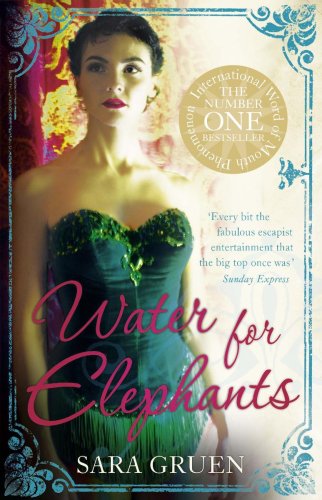 When I started to see posters appear on the Underground advertising the upcoming film of Sara Gruen’s Water for Elephants, I decided that it was probably time to get the book down from my shelves and read it. Although this review has been so long in the writing that the film has now been and gone from cinemas without my having seen it, from having read the book I’m sure it must have made a great film. There are some books which ask you to engage your critical faculties and revel in the impressive language, and there are others which keep any high-minded ideas you might previously have had about literature and good writing firmly under lock and key as you are swept away by a rollicking good story. Water for Elephants definitely falls into the latter category.
When I started to see posters appear on the Underground advertising the upcoming film of Sara Gruen’s Water for Elephants, I decided that it was probably time to get the book down from my shelves and read it. Although this review has been so long in the writing that the film has now been and gone from cinemas without my having seen it, from having read the book I’m sure it must have made a great film. There are some books which ask you to engage your critical faculties and revel in the impressive language, and there are others which keep any high-minded ideas you might previously have had about literature and good writing firmly under lock and key as you are swept away by a rollicking good story. Water for Elephants definitely falls into the latter category.
The novel is narrated by nonagenarian Jacob as he sits in his care home watching the circus set up from his window, sparking memories about his own time working for a travelling circus during the depression era. While working as the show’s vet he quickly falls in love with Rosie, the circus elephant, and Marlena, the girl who rides her. However, Marlena is married to short-tempered, brutal August who also happens to be Jacob’s boss. In spite of the obvious dangers, Jacob cannot forget his feelings for Marlena, and soon August’s cruel treatment of both her and Rosie proves too much for Jacob to bear.
Water for Elephants may not be the finest piece of writing that I’ve encountered this year, but that doesn’t mean it wasn’t a highly enjoyable book. It’s the sort of novel which prompts the reader to devour it with gusto, racing through the pages, carried along by the rapidly moving plot. I think it’s very telling that, even though this book has over 400 pages in the edition that I read, I polished the whole thing off in less than a day. I was totally absorbed in Jacob’s life in the circus and the dilemmas and hardships he faces. This book is all about the plot and that story is exciting and great fun to read.
Far from running away to the circus being an idealised dream, Gruen presents life on a depression era circus train as a gruelling, dirty, unhygienic experience. The animals are either half-starved or living on rotten meat; the only time the lions get anything fresh is when one of the horses dies and is fed to the hungry creatures. I’ve read quite a few reviews of Water for Elephants which object to the book because of the animal cruelty it depicts, but I thought that this approach, so different from what I was expecting in a book set in the glittering world of the circus, made the story far more interesting and realistic to me.
On the negative side, this is yet another book which is written in the present tense for no apparent reason, something which I find incredibly off-putting unless it is very skillfully executed. I don’t think it was in Water for Elephants. Particularly after reading Human Croquet recently and admiring the way in which tenses were employed there, it made little sense to me that both the sections set in the nursing home in the present day and the parts set in the circus in the past were written in the present tense. In fact, I didn’t think that the frame narrative of the older Jacob looking back on his younger days added anything to the book really. Although the speed at which I inhaled the story prevented me from being too distracted by it, nonetheless I would have much preferred it if it had been written in the perfect tense.
In spite of my niggles about the writing style, this book is not one to read for the style but for the excellent story. It is a good fun read and was the perfect novel for distracting my mind from wedding planning for a bit.
Water for Elephants by Sara Gruen. Published by Hodder, 2007, pp. 429. Originally published in 2006.
Review: ‘Song of Sorcery’ by Elizabeth Scarborough
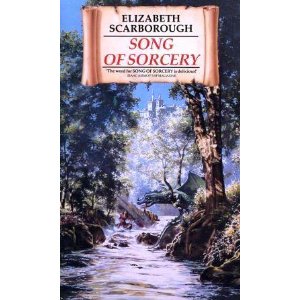 One of the many benefits of having such a large pool of books from which to choose my reading is that it’s easy to find something that fits my mood or requirements. A while ago I needed to pick a book to read before bed and so it needed to be light in every sense of the word: light in subject matter so that it enabled my brain to wind down before sleep without making it do much thinking, and physically light so that when I (inevitably) fell asleep reading it no lasting damage would be caused to my head. Hardbacks were also eliminated for this reason. In the end, I settled on a book which fulfilled these criteria perfectly: Song of Sorcery by Elizabeth Scarborough.
One of the many benefits of having such a large pool of books from which to choose my reading is that it’s easy to find something that fits my mood or requirements. A while ago I needed to pick a book to read before bed and so it needed to be light in every sense of the word: light in subject matter so that it enabled my brain to wind down before sleep without making it do much thinking, and physically light so that when I (inevitably) fell asleep reading it no lasting damage would be caused to my head. Hardbacks were also eliminated for this reason. In the end, I settled on a book which fulfilled these criteria perfectly: Song of Sorcery by Elizabeth Scarborough.
Song of Sorcery is a fantasy story about Maggie, a sensible, practical hearthwitch whose magic is used to light fires and cook meals. But when her beautiful, empty headed sister Amberwine runs away from her husband with a gypsy, she is forced to leave her comfortable home life to go and retrieve her errant sibling. Her travelling companions are Colin Songsmith, a minstrel who gets into trouble with Maggie’s grandmother by singing a popular song which has sprung up about Amberwine’s actions, and Ching, a talking cat.
Had I read this book ten or fifteen years ago, I’m sure I would have really enjoyed it as it has everything in it that little girls love: magic, unicorns, princesses, heroes, dragons, mermaids and talking animals. The problem is that I’m no longer a ten year old girl and, although this is theoretically a book for adults, it feels very juvenile. There are too many elements to the story given how short it is and they are all passed over too quickly without being particularly well developed so it feels rushed and bitty. Equally, the characters never progress beyond the caricatures needed to perform the actions of the story, which is a shame.
On the other hand, some aspects are expanded to the point of being ridiculous. Maggie’s domestic magical powers, for example, are used for everything from re-hydrating strips of dried venison in order to produce proper meals while camping to creating full length gowns out of her underwear. There are some little details which are entertaining and innovative. I particularly like their visit to Maggie’s aunt who lives in a gingerbread house and has to deal with all the terrible impracticalities that entails. It’s taking a typical fairytale trope and turning it on its head, which I love and I wish there were more of it.
This book fulfilled its purpose. It’s quite entertaining but entirely lacking in substance, which is what I wanted. I’ll probably continue with the other books in the series, but only before bed when my critical faculties are firmly switched off.
Song of Sorcery by Elizabeth Scarborough. Published by Bantam, 1987, pp. 216. Originally published in 1982.
Review: ‘Human Croquet’ by Kate Atkinson
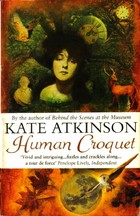 The Oxfam shop in my old university town used to sell bundles of three books tied up with string for £1.99. I acquired Human Croquet by Kate Atkinson at some point in my final year as part of just such a bundle, along with Alan Hollinghurst’s The Line of Beauty and A. S. Byatt’s Possession (neither of which I have yet read, shamefully). Both of these were books that I wanted to read, although the time constraints imposed by writing two dissertations put paid to it that year, so I was happy to pick them up, especially as they came with an extra, unfamiliar book thrown into the deal. I knew nothing at all about Kate Atkinson’s book, but nestled as it was between two Booker Prize-winners it was bound to be of a literary bent. I wasn’t really sure what I was in for when I picked it up off my shelf recently, prompted by hearing lots of good things about Atkinson in relation to her Jackson Brodie crime novels, but it certainly looked interesting and, as it transpired, I wasn’t wrong.
The Oxfam shop in my old university town used to sell bundles of three books tied up with string for £1.99. I acquired Human Croquet by Kate Atkinson at some point in my final year as part of just such a bundle, along with Alan Hollinghurst’s The Line of Beauty and A. S. Byatt’s Possession (neither of which I have yet read, shamefully). Both of these were books that I wanted to read, although the time constraints imposed by writing two dissertations put paid to it that year, so I was happy to pick them up, especially as they came with an extra, unfamiliar book thrown into the deal. I knew nothing at all about Kate Atkinson’s book, but nestled as it was between two Booker Prize-winners it was bound to be of a literary bent. I wasn’t really sure what I was in for when I picked it up off my shelf recently, prompted by hearing lots of good things about Atkinson in relation to her Jackson Brodie crime novels, but it certainly looked interesting and, as it transpired, I wasn’t wrong.
Human Croquet is narrated by Isobel Fairfax and is the story of her family and their neighbours in the village of Lythe. Isobel and Charles’ exotic mother disappeared when they were very young, followed soon after by their father, leaving the children in the care of their steely, old fashioned grandmother and their irascible Aunt Vinny. Even after their father returns several years later no one seems willing to talk about what happened or why. In fact, lots of people in Lythe are hiding things and keeping secrets to themselves, not least Isobel, who keeps finding herself slipping into other periods of time without any explanation.
This is in many ways a very odd book, but it was exactly my kind of odd. My family and I have always played word games and twisted phrases around on themselves, so Isobel’s narration reads rather like I think. The text is peppered with her humorous asides in which she pokes fun at herself:
He runs a hand through his dark curls and brushes them away from his handsome forehead, ‘You’re a good pal, Iz,’ he sighs. I am his friend, his ‘pal’, his ‘chum’ — more like a tin of dog food than a member of the female sex, certainly not the object of his desire.
At other people:
Malcolm Lovat. If I am to have a birthday wish it must be him. He is what I want for birthday and Christmas and best, what I want more than anything in the dark world and wide. Even his name hints at romance and kindness (Lovat, not Malcolm).
And, probably my favourite, when she takes common idiomatic phrases to absurd (yet also supremely logical) lengths:
‘I’m just marking time at Temple’s,’ Charles says, in explanation of his remarkably dull outer life. (Ah, but what does he give it? B-? C+? He should be careful, one day time might mark him. ‘Och, without doubt,’ Mrs Baxter says, ‘that’s the final reckoning.’)
Isabel’s narration is something that I suspect a reader will either love or hate, but for me it was one of the book’s main attractions.
Another aspect of the book that I particularly enjoyed is the way that Atkinson plays around with motifs from fairy tales (Cinderella and Hansel and Gretel spring to mind immediately as examples). She gives the well-known stories subtle nods without ever explicitly copying them, in a way that suggests that all is not quite as it seems. I found it simultaneously reassuringly familiar as I recognised elements of particular stories and unbalancing as what I knew of those stories indicated that things were not going to go as I expected, which is really how the whole novel works: fundamentally a story about family relationships, it is quite happy to have characters turning into dogs or time travelling without any indication that this is somehow unusual.
Atkinson has an approach to writing about different time streams which I have never come across before, but is so wonderfully simple I wonder why it’s not more common. When Isobel is talking about events taking place in the main timeline of the novel, she writes in the present tense; when she narrates scenes from earlier on in her life, they are written in the past tense. The clear definition between what has happened and what is happening is particularly helpful given how confusing and uncertain the reality of the present becomes, and I found the technique to be a good one (and how I wish Sarah Gruen had adopted it in Water for Elephants). Given my dislike of present tense narratives I was surprised by this for the second time this year. It turns out that I quite enjoy the present tense when it is used in a carefully considered manner and employed effectively.
Human Croquet is a bizarre and wonderful book which I suspect readers will either love as unreservedly as I did or find very odd indeed. Either way, it’s definitely worth trying.
Human Croquet by Kate Atkinson. Published by Black Swan, 1998, pp. 384. Originally published in 1997.
Review: ‘Elizabeth and her German Garden’ by Elizabeth von Arnim
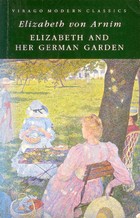 I very rarely plan what I’m going to read ahead of time, preferring to pick books from my shelves as the mood takes me, so it’s even more surprising when literary serendipity strikes. I really enjoy suddenly discovering that the book I’m reading is set in a place that I’ve just visited, references a book that I’ve read recently or has some other connection which makes it seem particularly relevant to me. In the case of Elizabeth and her German Garden, by complete coincidence I started reading it on the same date as the first entry in the book, May 7th. This should give you some idea of how long it has taken me to get round to this review, but my first foray into Elizabeth von Arnim’s writing was such a lovely experience that I can still remember the book remarkably clearly.
I very rarely plan what I’m going to read ahead of time, preferring to pick books from my shelves as the mood takes me, so it’s even more surprising when literary serendipity strikes. I really enjoy suddenly discovering that the book I’m reading is set in a place that I’ve just visited, references a book that I’ve read recently or has some other connection which makes it seem particularly relevant to me. In the case of Elizabeth and her German Garden, by complete coincidence I started reading it on the same date as the first entry in the book, May 7th. This should give you some idea of how long it has taken me to get round to this review, but my first foray into Elizabeth von Arnim’s writing was such a lovely experience that I can still remember the book remarkably clearly.
Elizabeth and Her German Garden is a semi-autobiographical account of a year in the life of Elizabeth von Arnim in the garden of her house in Pomerania. It is a book which is in equal parts an elegiac description of her physical surroundings and a keenly observed, wryly detached depiction of the people who inhabit that world with her, most of whom are apparently rather unwelcome.
At only 207 pages in the edition I read, and that with large type and larger margins, it is a short book but full of excellent content. Whether she is discussing plants or people, von Arnim’s writing is a delight to read, and my copy of the book is littered with tiny bits of paper marking pages with particularly lovely passages. Her musings on governesses are typical of her style which is both insightful and often amusing:
I wonder why governesses are so unpleasant. The Man of Wrath says it is because they are not married. Without venturing to differ entirely from the opinion of experience, I would add that the strain of continually having to set an example must surely be very great. It is much easier, and often more pleasant, to be a warning than an example, and governesses are but women, and women are sometimes foolish, and when you want to be foolish it must be annoying to have to be wise.
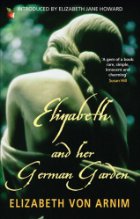 One of the things that struck me about this book was the faint air of sadness about it. I think it came across particularly because of reading Perfume from Provence quite recently, which also has a section on the trials and tribulations of creating a beautiful European garden. Whereas Winifred Fortescue’s happiness and enthusiasm burst from the page, Elizabeth appears to have a rather unhappy life and to be trying hard to create her own happiness along with her garden, although her attempts are often frustrated. I initially thought that The Man of Wrath must be a teasing, affectionate name for her husband, but the more she spoke about him, the more apt the name seemed, while Winifred Fortescue and Monsieur are obviously perfectly matched and gloriously content together. Had Perfume from Provence not been so fresh in my mind, this impression might not have come across so strongly, but as it is the tone felt slightly wistful.
One of the things that struck me about this book was the faint air of sadness about it. I think it came across particularly because of reading Perfume from Provence quite recently, which also has a section on the trials and tribulations of creating a beautiful European garden. Whereas Winifred Fortescue’s happiness and enthusiasm burst from the page, Elizabeth appears to have a rather unhappy life and to be trying hard to create her own happiness along with her garden, although her attempts are often frustrated. I initially thought that The Man of Wrath must be a teasing, affectionate name for her husband, but the more she spoke about him, the more apt the name seemed, while Winifred Fortescue and Monsieur are obviously perfectly matched and gloriously content together. Had Perfume from Provence not been so fresh in my mind, this impression might not have come across so strongly, but as it is the tone felt slightly wistful.
I long more and more for a kindred spirit–it seems so greedy to have so much loveliness to oneself–but kindred spirits are so very, very rare; I might as well cry for the moon. It is true that my garden is full of friends, only they are dumb.
In spite of this, Elizabeth and Her German Garden is not a sad or depressing book. Von Arnim has a great sense of comedy and the book is filled with wit and charm. Thankfully von Arnim seems to have been rather prolific, so I have plenty more of this to look forward to in her other novels.
Elizabeth and Her German Garden by Elizabeth von Arnim. Published by Virago, 1995, pp. 207. Originally published in 1898.
Reader, I married him
After eight years of being together, two years of engagement and several incredibly stressful weeks when the church lost our paperwork and declared we couldn’t get married unless they had it (we eventually received permission from the powers that be a mere eight days before the wedding) the Old English Thorn and I finally got married on 3rd September this year.
We had a truly fantastic day, surrounded by all our friends and family, before I was whisked off on a lovely surprise honeymoon in Cannes planned and organised entirely by my shiny new husband. We were away for a wonderful, sun-filled week, during which I ate excessive amounts of delicious seafood and the Thorn ate steak repeatedly (the perils of being a non-fish-eater in a French seaside town). We’re now back in soggy England, I’ve moved house and things are slowly settling down to normal, so I’m able to return to the world of the book blog once more.
My drastically reduced commute time (yay!) and the presence of a lovely husband when I get home (double yay!) means that my reading rate has reduced rather substantially. However, as the observant among you may notice that I haven’t reviewed any of the books I’ve read since the beginning of May, this should give me a chance to begin to catch up with myself while thoroughly enjoying our new married life.
Wedding Congratulations for Verity and Ken!
Love does not consist of gazing at each other, but in looking together in the same direction. ~Antoine de Saint-Exupery
Congratulations to Verity of CardiganGirlVerity and her fiance Ken who get married today in Austria. The Old English Thorn and I wish them all the best, both for today and for the rest of their lives together. Have a fantastic time and I look forward to seeing loads of pictures when you return to the blog world!
Pop over to Fleur Fisher Reads to see her wonderful compilation of quotations about love and marriage provided by members of the LibraryThing Virago Modern Classics group in celebration of their wedding.
Silent Running
My apologies for the relative silence here at Old English Rose Reads over the past few weeks. In the chaos of moving house (during which ongoing process I am coming to the realisation that I have far too many books), arranging a wedding, jumping through a succession of Catholic hoops and generally preparing for a new life with the Old English Thorn blogging has rather fallen by the wayside as spare time has become a thing of the past. The sporadic posting is likely to continue until mid-September when we will be happily married, returned from honeymoon to an unknown (to me; he knows where we’re going, obviously) location and living together for the first time ever in our eight year relationship. I am ever so excited, which more than makes up for being ever so busy and ever so slightly stressed by trying to do so many things at once.
(The lovely submarine stained glass window shown above is from the United States Naval Heritage Center on Pennsylvania Avenue. It’s rather beautiful, and you can click on the picture for more information from the photographer,who has kindly made the photo available under the Creative Commons Licence.)
TBR Lucky Dip: July
As I explained in my post about reading plans for the new year, each month I’m going to be using a random number generator to select a book from my TBR pile for me to read, to help me read more widely from my shelves.
This month, the deities of www.random.org have ordained that I should read book number 412. According to my TBR list this means that I am reading…
The Beauties of a Cottage Garden by Gertrude Jekyll
This is a celebration of the beauties and possibilities of Heoliotrope and Honeysuckle, Auricula, Snapdragon, Spanish Iris and Corydalis, and all the other plants that enliven and exalt the gardens of England. Gertrude Jekyll gives good advice on how to make a garden a place of repose and pleasure. Writing with enthusiasm on the colours and scents of flowers, on the frustrations (and delights) of weeding and on the debasing influence of flower shows, she is practical, wise and entertaining in equal measure.
The TBR Lucky Dip has yet to produce a pick with which I am not thrilled. The Beauties of a Cottage Garden pleases me for four reasons:
-
It is very short, which is an excellent thing as it’s already the 22nd July and I have only just made this selection, so I will be able finish it by the end of the month in spite of all the other demands on my time.
-
It is one of the few books which isn’t either packed up or already transported to The Flat In Which I Do Not Yet Live (well, reading books anyway; all the academic books are yet to come and the Old English Thorn is not going to know what’s hit him) meaning I can actually get at it.
-
It was originally published in 1899 and therefore counts towards the Victorian Literature Challenge.
-
It’s about gardens.
While I have very little interest or aptitude for gardening, I enjoy spending time in the garden when the weather is fine. In fact, one of the many attractive features of our new flat is that it has a very nice garden with flowers and a perfectly striped lawn that is magically tended for us, so all we need to do is sit outside and take advantage of it. This year I’ve already enjoyed a couple of books which take gardens as their theme, so hopefully this book will prove equally entertaining. After all, it does feel like the right time of year to be reading about gardens.
Review: ‘Ballet for Drina’ by Jean Estoril
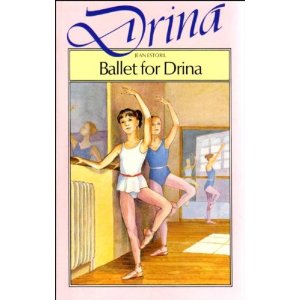 Like a great many little girls, I took ballet lessons when I was younger. I was never particularly good at it and I stopped taking exams when they required that I start pointe work, but I really enjoyed it. As an adult, I still really enjoy ballet but, though I do take the occasional class from time to time, I mostly enjoy watching it. When a lot of the books that I’d been saving from childhood were ruined by water damage a few months ago, the huge stash of ballet books reminded me of how much I had liked reading about it as well. Among my favourites were the Drina books be Jean Estoril, all of which were sadly beyond salvage, so I’ve been slowly reacquiring them to see if they’ve stood the test of time and so far I’m rather enjoying the experience of rereading them.
Like a great many little girls, I took ballet lessons when I was younger. I was never particularly good at it and I stopped taking exams when they required that I start pointe work, but I really enjoyed it. As an adult, I still really enjoy ballet but, though I do take the occasional class from time to time, I mostly enjoy watching it. When a lot of the books that I’d been saving from childhood were ruined by water damage a few months ago, the huge stash of ballet books reminded me of how much I had liked reading about it as well. Among my favourites were the Drina books be Jean Estoril, all of which were sadly beyond salvage, so I’ve been slowly reacquiring them to see if they’ve stood the test of time and so far I’m rather enjoying the experience of rereading them.
In the first installment in the series, Ballet for Drina, the reader is introduced to Drina, a little girl who lives with her grandparents, Mr and Mrs Chester, following the death of her mother and father when she was very young. She loves to dance but has never been allowed to take lessons and her grandmother refuses to discuss why. When Drina changes schools she makes friends with Jenny Pilgrim, who hates dancing and wants to work on a farm but whose mother insists she take ballet classes. Eventually Mrs Chester bows to pressure and allows Drina to join in, until Mr Chester’s job takes the family away from Warwickshire and the ballet school that Drina loves to live in London.
This book was exactly how I remember it from when I was little: simple and uncomplicated but sweet and charming. Reading as an adult there is never any real tension or suspense as it is abundantly clear how things are going to pan out from the very beginning, but I remember feeling every one of Drina’s emotions as she suffers the agonies of not knowing whether she will be able to continue with her beloved dancing classes. It evokes the strong feelings of childhood, in which everything is either the best thing ever or the end of the world, very well, but does not do so in a reflective way which might broaden its appeal to adults as well. Ballet for Drina is unashamedly a children’s book.
I’m not sure how much of my enjoyment of this book is due to happy memories of having read it as a child, but it remains an absorbing way to pass an hour. Sometimes it is nice to read a gentle, relaxing book in which there are no real surprises and everything works out for the best.
Ballet for Drina by Jean Estoril. Published by Macdonald, 1988, pp. 176. Originally published in 1957.

